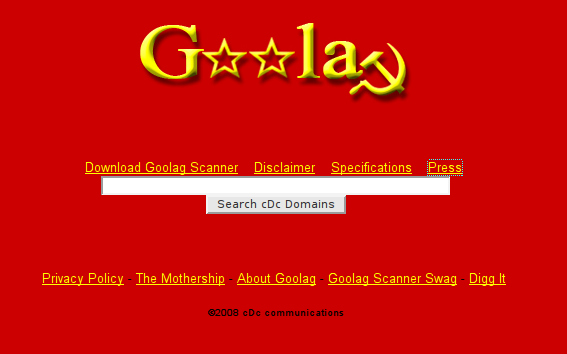UPDATE: How wrong could I be about the severity of this threat? Very wrong, apparently. I haven’t confirmed it yet, but it’s hard to imagine how this week’s mass server hack could have happened without tools like the one described below. I’ll write more about this in this week’s column….
Heh, cute:
Cult of the Dead Cow Announces Goolag Vulnerability Search Engine. Once you get past the Chinese porn silliness, there’s a real story here:
Once you get past the Chinese porn silliness, there’s a real story here:
Google’s effectiveness as a search engine also makes it an effective… well, search engine. Common website weaknesses are exposed by search engines such as Google, and anyone can access them by using specially crafted queries that take advantage of Google’s advanced searching capabilities. As the cDc press release indicates, there are approximately 1500 such searches published and readily accessible on the Internet. And now the cDc has built a(n a)cutely satirical web front end and are offering a downloadable desktop search application for Windows, giving script kiddies the world over something else to do with their time.
What effect has this had on website security? It’s difficult to tell. The principle of using Google as a scanning tool has been common knowledge since at least 2006, but according to Zone-H, who record large numbers of website defacements every year, the only significant increase in website attacks since then was the result of an online gang war between various Russian criminal factions, back in 2006. Ignoring that anomalous rise in activity, the rate of attack actually fell slightly in 2007 compared to recent years, relative to the number of active websites.
Zone-H’s latest report proves only that the percentage of insecurely configured websites scales on a roughly linear basis with the number of available websites, and that the choice of technology has almost no bearing on the likelihood of a successful attack. Indeed, most exploits are simple attacks on inherent weaknesses: guessing admin passwords or copying them when they’re sent in cleartext, misconfigured shares and unsafe, unpatched applications. Attacks requiring any amount of individual effort are not very common at all. Man-in-the-middle attacks rated only fifth place in the list of common exploits, representing only 12% of that total. But researchers have elsewhere noted that cross-site-scripting attacks are on the rise, and are being used mostly by spammers to increase the size of their bot nets.
The lesson here is fairly obvious: Making simple mistakes is the easiest way to expose yourself to attack. And search tools like Goolag make finding those mistakes remarkably easy. You won’t be targeted so much as stumbled across. Given the recent rise in the number of websites being used to inject malicious software into people’s computers, spammers and other online criminals appear to have a strong incentive to use even the less popular websites to ply their trade.
Your choice of technology won’t save you, either. Most popular web servers are fairly secure these days and though not all server operating systems are created equal, the big ones have improved markedly. But the same cannot be said of the applications and frameworks that run on them. The old adage that ease of use is universal still applies. When you make things easy for yourself and your users, you are liable to make things easy for other, less welcome guests as well.
The lesson for the average website owner: Do the simple things well. Don’t waste your time trying to imagine how some intrepid cyber-ninja is going to magically fly across your digital alligator moat. Just make sure your systems are well-chosen and properly patched, pay attention to access control and treat authentication seriously. Statistically, at least, this will drop your chances of being Pwned to nearly nil, or close enough as makes no never mind.

 Once you get past the Chinese porn silliness, there’s a real story here:
Once you get past the Chinese porn silliness, there’s a real story here: